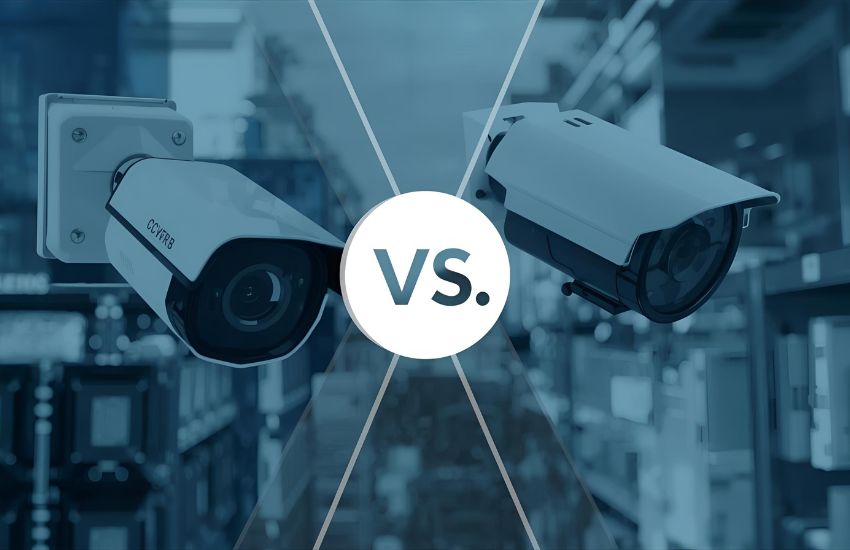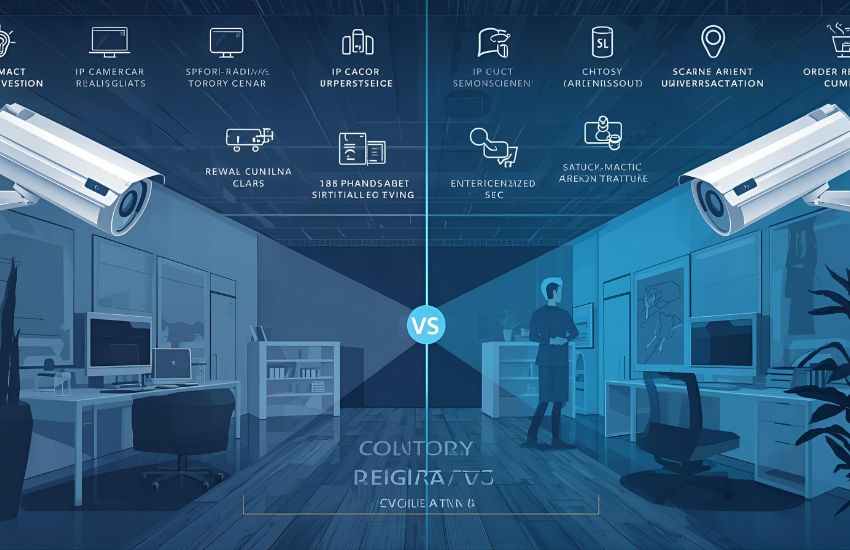Choosing between an IP camera and traditional CCTV can significantly impact your security system’s effectiveness. Both types of cameras serve the vital purpose of monitoring and protecting your property, but their technology and capabilities differ in meaningful ways. While analog cameras have long been the foundation of many CCTV systems, the rise of HD IP cameras offers enhanced image quality and flexibility by transmitting video over networks rather than coaxial cables.
IP cameras offer high-resolution, remote access, and easy installation via internet connectivity, making them ideal for modern, scalable surveillance. CCTV systems provide reliable, wired security with minimal latency, often used in basic surveillance setups. Choosing between them depends on specific needs like image quality, installation complexity, and real-time monitoring requirements for effective security solutions.
Key Differences Between IP Camera vs Analog CCTV for Security

When evaluating the key differences between IP camera vs analog CCTV for your security needs, it’s important to understand how each system functions and what advantages they bring. Analog CCTV systems rely on traditional analog signals transmitted through coaxial cables to deliver video footage. These systems typically use wired CCTV connections and analog cameras, which have been widely deployed for decades in both residential and business security setups. In contrast, an IP camera system uses digital video cameras—often referred to as network cameras—that transmit high-definition video over an IP network. This allows for greater flexibility, including the use of wireless IP cameras and easy integration with modern surveillance infrastructure.
One of the most notable differences between IP cameras and analog CCTV is image quality. HD CCTV cameras offer improved resolution compared to older analog systems, but IP cameras often surpass them with superior detail and clarity due to digital transmission and processing. Additionally, IP cameras offer advanced features such as remote access, intelligent analytics, and scalability that analog systems may lack or only support with additional hardware.
When considering IP cameras and CCTV cameras vs one another, keep in mind that IP security cameras are designed to provide more efficient and adaptable solutions tailored to evolving security needs. Whether for home security cameras or extensive business security, the choice between analog systems and IP network technology will shape the performance, maintenance, and overall effectiveness of your surveillance cameras. Understanding these distinctions will help you select the best camera system that aligns with your unique requirements.
See more about…Security Camera App: DVR
Choosing Best Security Cameras: HD CCTV or IP Security Cameras

Understanding What’s the Difference Between HD CCTV and IP Security Cameras
When deciding on the best type of camera for your surveillance needs, you may ask, what’s the difference between HD CCTV and IP security cameras? HD CCTV cameras traditionally use analog signals transmitted via coaxial cables, delivering improved resolution over older analog CCTV cameras. In contrast, IP security cameras—also known as internet protocol cameras—transmit digital video over a network, allowing greater flexibility and advanced features. This fundamental distinction affects how each system operates and integrates with your overall security infrastructure.
Image Quality and Performance: HD Over Coax Cameras vs IP Cameras
You will notice that IP cameras support better image quality compared to IP and HD CCTV cameras using coaxial cables. While HD over coax cameras offer enhanced clarity compared to standard analog CCTV cameras, IP cameras often provide superior resolution and color accuracy. Additionally, IP cameras enable features such as remote viewing, motion detection, and intelligent analytics that can enhance your surveillance system’s effectiveness.
Integration and Installation Considerations
Choosing between HD CCTV and IP cameras also involves understanding how these cameras integrate with other security systems. CCTV cameras use analog technology, which can limit integration capabilities and require more complex wiring. Conversely, IP cameras are designed for easy integration within a network, supporting wireless CCTV cameras and allowing seamless connectivity with access control or alarm systems. Considering your installation environment and future scalability will help you determine the best security camera system for your needs.
How Modern Surveillance Cameras Combine IP and HD for Safety
Enhancing Surveillance and Security with IP and HD Technology
For effective surveillance and security, modern cameras combine the best features of IP and HD technology to meet diverse security purposes. IP cameras capture high-resolution video over a network, allowing you to monitor footage remotely and in real-time. These cameras provide greater flexibility and scalability, making them ideal for environments requiring advanced monitoring. Unlike IP cameras, traditional analog cameras require coaxial cables to transmit footage, limiting their reach and integration capabilities.
How Cameras Capture Clearer Images Using Network Technology
IP cameras capture video over a network, often utilizing a local area network to transmit data efficiently. This method allows cameras to provide clearer and more detailed images compared to analog counterparts. Cameras also support advanced functions like motion detection and intelligent video analytics, which enhance security by identifying unusual activity automatically. Analog cameras require more manual monitoring and are less adaptable to modern security system demands.
The Benefits of Combining IP and HD in Surveillance Systems
When IP cameras are combined with HD technology, you gain the advantages of superior image quality and network flexibility. IP cameras compared to analog systems offer improved installation options, including wireless setups, while delivering HD clarity for precise identification and evidence collection. This hybrid approach ensures your surveillance cameras provide robust, reliable security solutions tailored to your specific needs
See more about…View Security Cameras Installed at Multiple Locations
Conclusion
Cameras that use both IP and HD technologies often provide the most comprehensive security solutions available today. These cameras support advanced features that enhance monitoring capabilities, making them ideal for a wide range of security purposes. While cameras often vary in complexity, those used in basic surveillance may lack the flexibility and image quality that modern systems offer. Ultimately, selecting cameras that support your specific needs ensures you invest in reliable and effective surveillance, delivering peace of mind and enhanced protection.
Frequently Asked Questions (IP Camera vs CCTV: Choosing the Right Surveillance Solution for Modern Security Needs)
Which is better, IP camera or CCTV?
IP cameras are generally better than traditional CCTV because they offer higher resolution, remote access via the internet, and advanced features like motion detection and video analytics. CCTV systems are more affordable and simpler to install but provide lower image quality and limited scalability. For long-term security needs, IP cameras are more reliable and future-proof.
Which of the following is an advantage to having an IP camera instead of CCTV?
An advantage of having an IP camera instead of traditional CCTV is its ability to deliver higher resolution video with clearer details. IP cameras can be accessed remotely through the internet, allowing real-time monitoring from smartphones or computers. They also support advanced features like motion detection, storage flexibility, and easy scalability, making them more versatile and efficient than CCTV.
What is the difference between a surveillance camera and CCTV?
The main difference between a surveillance camera and CCTV is their scope and technology. CCTV (Closed-Circuit Television) uses wired connections to transmit video to a limited set of monitors, mainly for local monitoring. Surveillance cameras, often IP-based, can be wired or wireless, offering remote access, higher resolution, cloud storage, and advanced features like motion detection and analytics.
How to choose a suitable CCTV camera for your needs?
To choose a suitable CCTV camera, consider your security needs, location, and budget. Decide between indoor or outdoor use, check resolution quality (HD or 4K), night vision capability, and storage options (cloud or DVR). Look for motion detection, remote access, and weather resistance. Select a trusted brand offering reliable support and warranty.
